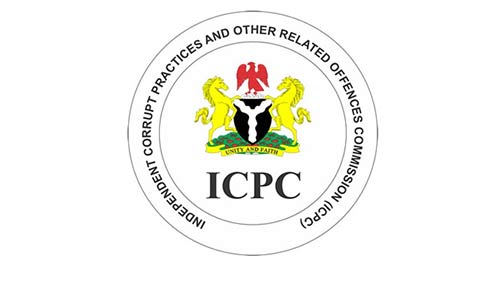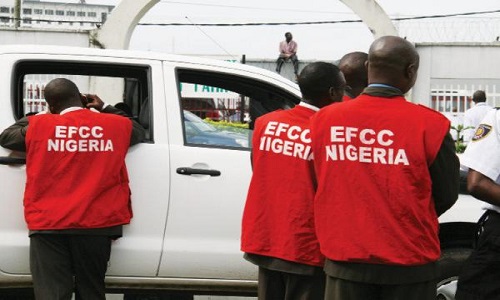LAW ENFORCEMENT 19/10/2022
ICPC Shutdown 62 Illegal Degree Awarding Institutions, Fake NYSC Camp

The Independent Corrupt Practices and Other Related Offences Commission (ICPC) said it had succeeded in closing down 62 illegal Degree awarding institutions in the country.
The commission also said it closed down a fake NYSC Orientation Camp in its bid to tackle corruption in the education sector.
The Chairman, Prof. Bolaji Owasanoye, disclosed this at a Youth Dialogue on Corruption in Tertiary Institutions, held in Abuja on Tuesday.
The News Agency of Nigeria (NAN) reports that the dialogue was organised by ICPC for members of Anti-corruption Vanguards from five tertiary institutions in the FCT.
Owasanoye, who was represented by Mrs Hannatu Mohammed, ICPC Board Member in-charge of youth, said that the Commission had since prosecuted the perpetrators.
According to him, corruption has debilitating effect on the quality of education of any nation, as no nation will develop beyond the level and quality of its education.
He said that the ICPC set up the anti-corruption vanguards in schools to push the fight against corruption in the education sector, particularly tertiary institutions.
Owasanoye further explained that the anti-corruption vanguards provided students the needed opportunity to participate actively in the fight against corruption in their various institutions.
“The vanguards equip the student members with the capacity to develop zero tolerance for corruption and to inculcate attitudinal change among their fellow students.
“The vanguards also enable the students to assist the management of their various institutions to effectively reduce corruption in the education system,” he said.
Owasanoye said apart from the setting up of the anti-corruption vanguards, ICPC had conducted System Study and Review in the University system to identify operations that provided leeway for corruption to thrive.
He noted that the study discovered various infractions in the university system, such as bribery, gratification, sexual harassment and sexual inducement, examination malpractices, over invoicing and over-inflation contract values.
Others according to him include, award of contracts to oneself and cronies, sale of sub standard handouts to students, absenteeism, admission racketeering and certificate forgery.
He, however, stated that the commission had since articulated its findings and recommended effective and workable solutions and forwarded it to the Minister of Education for implementation.
In a keynote address, Prof. Williams Barnabas, Vice Chancellor, Bingham University, said Nigerian education system must be repositioned to contribute significantly to national development.
He called for proper scrutiny of students entering tertiary institutions, to ensure that they have the right maturity and moral background and were willing to develop life skills instead of cutting coners.
Barnabas said corruption in tertiary institutions impact significantly on the availability and quality of educational goods and services and has consequences on access, quality and equity in education.
He added that some of the corrupt practices by academic staff include shrinking hours spent in classroom teaching, using teaching time for private business, and grades inflation among others.
The vice chancellor added that parents also push students into corruption by buying grades or bribing lecturers for good grades for their children.
“The use of teaching time for private business, failure of teachers to plan their lessons, poor methods of evaluation, aiding and abating examination malpractices and using wrong teaching methods are seen as corruption.
“Corruption erodes the core values of the educational process and thereby undermines and distorts hurman capital formation.
“It also weakens social cohesion by engendering distrust in interpersonal and intergroup relation, ” he said.
Barnabas said for the country to get it right, “our tertiary institutions must stick to their mandate of teaching, research and community service.
“We should also promote the culture of transparency at all levels; education against corruption for all; set up anti-corruption committees that utilise strategies in the fight against corruption.”
On his part, Mr Mohammed Ashiru, Director, Public Enlightenment and Education, ICPC, said that the overall objective of the dialogue was to ginger the youth to play the role expected of them in the fight against corruption.
He said this would be done through brainstorming and enumerating the major problems corruption generate in the education sector.
Ashiru added that to address the problem of corruption in the education sector, the ICPC had interfaced with key stakeholders in the sector and identified various restructures in the system.
“The partnership led to the involvement of students to hear their perspective on the problem of corruption in the tertiary institutions, hence the result to organise this dialogue.
“The sole purpose of the dialogue is giving youth the avenue to air their mind freely on the problem of corruption in tertiary institutions in Nigeria without fear or favour.
“Panel discussion from the five participating institutions will be on subjects such as the achievements of Anti-Corruption Vanguards in the fight against corruption in tertiary institutions in Nigeria.
“Others topics include, challenges of sensitising fellow students against anti-social behaviour; how to manage sexual harassment in tertiary institutions
“What they understand by vote buying and how they will contribute towards eliminating vote buying in Nigeria’s electorate process; between preventive and punitive measures, which one fights corruption better, among others.” (NAN)





